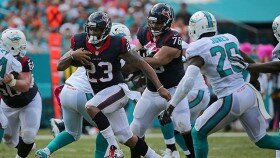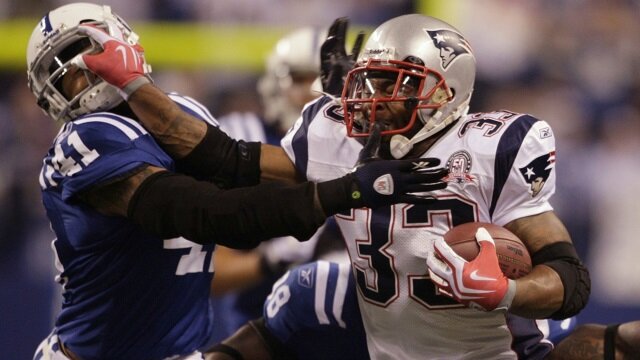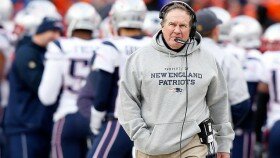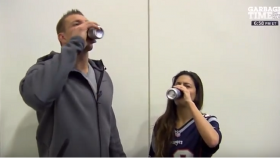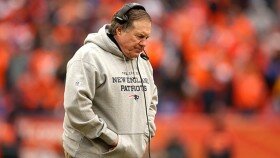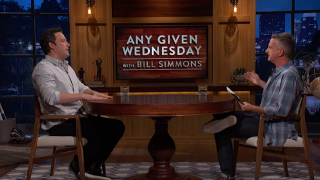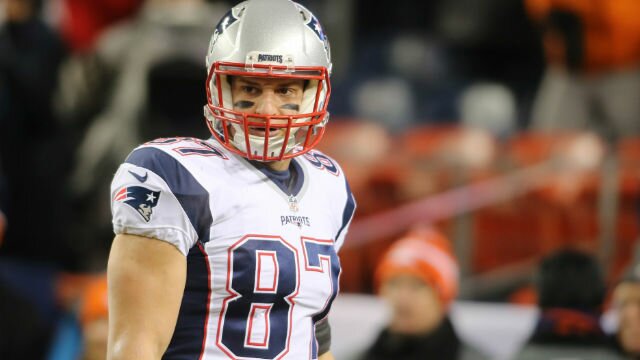2014 New England Patriots' Place Among the 49 Super Bowl Champions



Who is the greatest Super Bowl champion in NFL history? It's a question that is often asked, but one that never has a single answer. Every team that has hoisted the Lombardi Trophy has been great, but some teams were just better than the others. Here now are the greatest Super Bowl Champions from worst to best.
49. 1982 Washington Redskins (Super Bowl XVII)

49. 1982 Washington Redskins (Super Bowl XVII)



In a strike-shortened season, the Washington Redskins finished 8-1 in the regular season and kicker Mark Moseley was named NFL MVP, which was the only time this will happen. In Super Bowl XVII against the Miami Dolphins, it took the Redskins three and a half quarters to pull away from the Miami Dolphins and win 27-17. The Redskins won primarily because Miami's quarterback, David Woodley, completed just four passes in the entire game.
48. 1970 Baltimore Colts (Super Bowl V)

48. 1970 Baltimore Colts (Super Bowl V)



The 1970 Baltimore Colts avenged their embarrassing Super Bowl III defeat, but it wasn't in the prettiest way possible. The Colts finished 11-2-1 in the regular season, their first in the newly formed AFC. In Super Bowl V against the Dallas Cowboys, the Colts committed seven turnovers, but won on a last-second field goal by Jim O'Brien 16-13. The Colts had an easy schedule in 1970 and played just three teams with a .500 record or better.
47. 2005 Pittsburgh Steelers (Super Bowl XL)

47. 2005 Pittsburgh Steelers (Super Bowl XL)



After starting 7-5 in the regular season, the Pittsburgh Steelers got hot late, earning a Wild Card berth after finishing 11-5. Their luck continued in the postseason as the the Cincinnati Bengals, their first opponent, lost star QB Carson Palmer. Their second opponent, the Indianapolis Colts, shanked a game-tying field goal, allowing the Steelers to win. In Super Bowl XL against the Seattle Seahawks, Pittsburgh had an unimpressive 21-10 win.
46. 1987 Washington Redskins (Super Bowl XXII)

46. 1987 Washington Redskins (Super Bowl XXII)



The 1987 Washington Redskins became the the second Redskins team in the 80's to win a Super Bowl in a strike-shortened season. Washington finished 11-4, and after trailing Denver 10-0 in Super Bowl XXII, Washington scored 42 unanswered points for an easy win.
45. 1968 New York Jets (Super Bowl III)

45. 1968 New York Jets (Super Bowl III)



The 1968 New York Jets are the team that started the merger between the AFL and NFL with their victory in Super Bowl III, but this team was not dominant by any means. In the regular season, the Jets finished just third in the AFL and Joe Namath threw more interceptions than touchdowns. In Super Bowl III against the Baltimore Colts, the Jets collected five turnovers and won 16-7.
44. 2001 New England Patriots (Super Bowl XXXVI)

44. 2001 New England Patriots (Super Bowl XXXVI)



The first of New England's four Super Bowl teams, the 2001 squad was the least talented of them all. The Patriots went 11-5 and a got a good break when the "Tuck Rule" went their way against Oakland. In Super Bowl XXXVI against the St. Louis Rams, the Patriots won on a last-second field goal by Adam Vinatieri.
43. 2007 New York Giants (Super Bowl XLII)

43. 2007 New York Giants (Super Bowl XLII)



The 2007 New York Giants will always be remembered as the team that dethroned the undefeated New England Patriots in Super Bowl XLII, but this team wasn't a juggernaut. The Giants finished 11-5 in the regular season and were the No. 5 seed in the NFC. The Giants reached Super Bowl XLII after defeating both Dallas and Green Bay on the road. In the Super Bowl, the Giants won 17-14 after a game-winning drive and a helmet catch by David Tyree.
42. 1980 Oakland Raiders (Super Bowl XV)

42. 1980 Oakland Raiders (Super Bowl XV)



The first Wild Card team from any conference to win the Super Bowl, the 1980 Oakland Raiders finished 11-5 in the regular season. After passing some stiff tests in the playoffs (Cleveland and San Diego), the Raiders dominated the Philadelphia Eagles in Super Bowl XV 27-10. Rod Martin led the way on defense as he recorded three interceptions, but quarterback Jim Plunkett was named Super Bowl MVP.
41. 1990 New York Giants (Super Bowl XXV)

41. 1990 New York Giants (Super Bowl XXV)
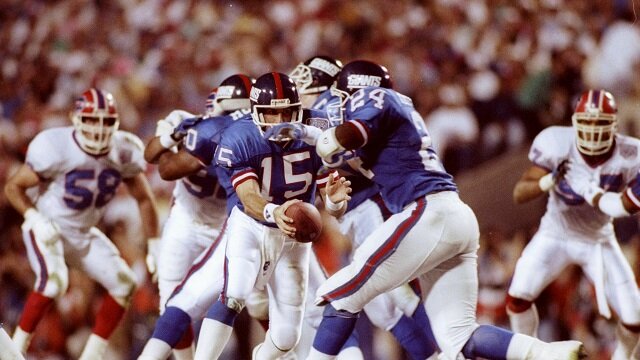


The 1990 New York Giants finished 13-3 in the regular season, but they had some lucky breaks in winning their second Super Bowl title in five seasons. Jeff Hostetler effectively replaced an injured Phil Simms and helped the Giants dethrone the two-time Super Bowl champion San Francisco 49ers in the NFC Championship game. In Super Bowl XXV against Buffalo, New York needed a Scott Norwood missed field goal to defeat the Bills 20-19.
40. 1974 Pittsburgh Steelers (Super Bowl IX)

40. 1974 Pittsburgh Steelers (Super Bowl IX)



The first of Pittsburgh's Super Bowl teams in the 1970s, the 1974 Steelers were by far the worst of their four championship teams. Terry Bradshaw was benched for most of the season, and the Steelers finished just 10-3-1 in the regular season. In the postseason, the Steelers dominated Buffalo and Oakland as they reached Super Bowl IX. Against an inferior Minnesota Vikings team, the Steelers did not secure their 16-6 victory until late in the game.
39. 2011 New York Giants (Super Bowl XLVI)

39. 2011 New York Giants (Super Bowl XLVI)



The only 9-7 team to win the Super Bowl, the 2011 New York Giants got hot late, just like they did in 2007, and once again upset Tom Brady and the Patriots. The Giants defeated the 15-1 Packers and the 13-3 49ers in the NFC Playoffs in order to face the Patriots again. In Super Bowl XLVI, the Giants got a miracle sideline catch by Mario Manningham, which helped them score the game-winning touchdown, giving the Giants a 21-17 win.
38. 2006 Indianapolis Colts (Super Bowl XLI)

38. 2006 Indianapolis Colts (Super Bowl XLI)



The 2006 Indianapolis Colts were not even the most talented Colts team in the early 2000's, but this team was the only one that went on to win a Super Bowl. Finishing the regular season at 12-4, the Colts were the No. 3 seed in the AFC and defeated New England in the AFC Championship Game after trailing 21-3. In Super Bowl XLI against the Chicago Bears, the Colts trailed 14-6 early in the game, but won easily 29-17.
37. 2000 Baltimore Ravens (Super Bowl XXXV)

37. 2000 Baltimore Ravens (Super Bowl XXXV)



The 2000 Baltimore Ravens had perhaps the greatest single-season defense in NFL history, but their offense was also one of the worst ever to win a Super Bowl. The Ravens managed to earn a 12-4 record despite not scoring a touchdown for five consecutive games. Against the overmatched Giants in Super Bowl XXXV, the Ravens easily won 34-7, and only a kick return touchdown prevented the Ravens from recording the first shutout in Super Bowl history.
36. 1988 San Francisco 49ers (Super Bowl XXIII)

36. 1988 San Francisco 49ers (Super Bowl XXIII)



The third of four Super Bowl winning teams in the 1980's, the 1988 San Francisco 49ers were the weakest team to win a Super Bowl during their dynasty. Finishing just 10-6 in the regular season, the 49ers turned the switch in the postseason, outscoring their NFC opponents 62-12. Against the Cincinnati Bengals in Super Bowl XXIII, the 49ers needed a Joe Montana to John Taylor touchdown in the final minute of the game to win 20-16.
35. 1995 Dallas Cowboys

35. 1995 Dallas Cowboys



The final Super Bowl team in Dallas' dynasty, the 1995 Cowboys won the organization's only championship in Barry Switzer's tenure. In the NFC Championship Game, the Cowboys defeated Brett Favre's Packers 38-27 to advance to Super Bowl XXX. Against the Pittsburgh Steelers, the Cowboys won 27-17 behind Larry Brown's two interceptions (both of which Pittsburgh's Neil O'Donnell threw right to him).
34. 2012 Baltimore Ravens (Super Bowl XLVII)

34. 2012 Baltimore Ravens (Super Bowl XLVII)



The Baltimore Ravens took the hard route in 2012, as the franchise won its second Super Bowl title in franchise history. During their postseason run, the Ravens defeated quarterbacks Andrew Luck, Peyton Manning, Tom Brady and Colin Kaepernick, four of the best in the game today. Against San Francisco in Super Bowl XLVII, the Ravens jumped out to a 28-6 lead and held on late to win 34-31 in what would be Ray Lewis' final NFL game.
33. 2010 Green Bay Packers (Super Bowl XLV)

33. 2010 Green Bay Packers (Super Bowl XLV)



The 2010 Green Bay Packers were the first No. 6 seed in the NFC to appear in the Super Bowl and the first to win a Super Bowl. Injuries plagued this team all year, but the Packers got hot late in the season as they defeated the top three seeds in the NFC en route to Super Bowl XLV. Against the Pittsburgh Steelers, the Packers jumped to a 21-3 lead and held on late to win 31-25.
32. 2002 Tampa Bay Buccaneers (Super Bowl XXXVII)

32. 2002 Tampa Bay Buccaneers (Super Bowl XXXVII)



Behind an all-time great defense, the 2002 Tampa Bay Buccaneers finally won the team's first Super Bowl after years of coming up so close. In Jon Gruden's first season as head coach, the Bucs finished 12-4 and were the No. 2 seed in the NFC. In Super Bowl XXXVII against Oakland, Gruden's former team, the Bucs stymied the Raiders' top-ranked offense, winning easily 48-21 as the defense scored three touchdowns off interceptions.
31. 1967 Green Bay Packers (Super Bowl II)

31. 1967 Green Bay Packers (Super Bowl II)



The last of Vince Lombardi's championship teams, the 1967 Green Bay Packers became the last team to win three consecutive championships. Green Bay finished just 9-4-1 in the regular season, but the defense carried the way in the postseason. The Packers outlasted Dallas in the Ice Bowl to advance to Super Bowl II. Against the Oakland Raiders, Green Bay dominated throughout and had an easy 33-14 victory.
30. 1993 Dallas Cowboys (Super Bowl XXVIII)

30. 1993 Dallas Cowboys (Super Bowl XXVIII)



The second of back-to-back title teams, the 1993 Dallas Cowboys became the first team to start 0-2 and win the Super Bowl. In the postseason, Dallas defeated a future Hall of Fame quarterback in Brett Favre and two Hall of Fame quarterbacks in Steve Young and Jim Kelly. After trailing 13-6 in Super Bowl XXVIII against the Buffalo Bills, the Cowboys scored 24 unanswered points to win easily 30-13.
29. 1997 Denver Broncos (Super Bowl XXXII)

29. 1997 Denver Broncos (Super Bowl XXXII)



After three failures in previous Super Bowls, John Elway finally had a team that could carry him instead of vice versa. The 1997 Denver Broncos entered as a Wild Card team after finishing 12-4 in the regular season. In the AFC playoffs, Denver defeated Jacksonville and upset both Kansas City and Pittsburgh on the road. In Super Bowl XXXII against Green Bay, Denver defeated the Packers 31-24 as Terrell Davis ran for 157 yards and three scores.
28. 1981 San Francisco 49ers (Super Bowl XVI)

28. 1981 San Francisco 49ers (Super Bowl XVI)



If not for "The Catch" by Dwight Clark and a clutch tackle by Eric Wright in the NFC Championship game, the 1981 San Francisco 49ers would not have been the team that started the 49ers' dynasty in the 1980's. After finishing 6-10 in 1980, the 49ers went 13-3 as they entered Super Bowl XVI. Against Cincinnati, they held a 20-0 halftime lead and used a goal-line stand in the second half to defeat the Bengals 26-20.
27. 2008 Pittsburgh Steelers (Super Bowl XLIII)

27. 2008 Pittsburgh Steelers (Super Bowl XLIII)



The 2008 Pittsburgh Steelers overcame one of the toughest schedules in NFL history and finished 12-4, earning the No. 2 seed in the AFC. The Steelers had impressive wins against San Diego and Baltimore as they reached Super Bowl XLIII. Against the Arizona Cardinals, Pittsburgh held a 20-7 lead but trailed 23-20 late. A touchdown reception by Santonio Holmes in the final minute of the game gave Pittsburgh a dramatic 27-23 victory.
26. 1979 Pittsburgh Steelers (Super Bowl XIV)

26. 1979 Pittsburgh Steelers (Super Bowl XIV)



The 1979 Pittsburgh Steelers completed their dynasty in the 1970's, but this team was not as dominant as the prior two Super Bowl champion teams. The Steelers committed the most turnovers in the NFL, but still posted a 12-4 record. Pittsburgh defeated both Miami and Houston as they entered Super Bowl XIV. Against a 9-7 Los Angeles Rams team, the Steelers trailed 19-17 in the third quarter before pulling away in the fourth, winning 31-19.
25. 2003 New England Patriots (Super Bowl XXXVIII)

25. 2003 New England Patriots (Super Bowl XXXVIII)



After a shaky 2-2 start, the 2003 New England Patriots ran off 12 consecutive wins in the regular season to finish 14-2. In the AFC Championship Game against Indianapolis, Ty Law picked off Peyton Manning three times as the Patriots won 24-14, entering Super Bowl XXXVIII. Against the Carolina Panthers, the two teams were tied at 29 late in the game before Tom Brady marched the Pats down the field as Adam Vinatieri made a game-winning field goal.
24. 2009 New Orleans Saints (Super Bowl XLIV)

24. 2009 New Orleans Saints (Super Bowl XLIV)



In 2005, Hurricane Katrina devastated New Orleans and the Saints. but three seasons later, the Saints finally became Super Bowl champions. New Orleans started 13-0 before dropping their final three games. In the playoffs, they defeated quarterback legends Kurt Warner, Brett Favre and Peyton Manning in three straight games. In Super Bowl XLIV against Indianapolis, the Saints used a pick-six late in the game to pull away and win 31-17.
23. 1999 St. Louis Rams (Super Bowl XXXIV)

23. 1999 St. Louis Rams (Super Bowl XXXIV)



The St. Louis Rams went from 3-13 in 1998, to 13-3 and Super Bowl XXXIV champions in 1999. The main reasons for their turnaround were unheralded quarterback Kurt Warner, who led the Rams after Trent Green was injured in the postseason, and Mike Martz, who guided one of the most potent offenses in NFL history. Against the Tennessee Titans in Super Bowl XXXIV, the Rams defeated the Titans 23-16 as Mike Jones prevented a game-tying touchdown.
22. 1998 Denver Broncos (Super Bowl XXXIII)

22. 1998 Denver Broncos (Super Bowl XXXIII)



The 1997 Denver Broncos were a good team, but the 1998 Broncos were a great team. Going 14-2, the Broncos relied on Terrell Davis, who rushed for 2,008 yards in the regular season. In the playoffs, Denver won all three of their games by at least 13 points. In Super Bowl XXXIV against the Atlanta Falcons, the Broncos picked up an efficient 34-19 win as John Elway threw for 336 yards and won his final NFL game.
21. 1973 Miami Dolphins (Super Bowl VIII)

21. 1973 Miami Dolphins (Super Bowl VIII)



Coming off their undefeated season from the year prior, the 1973 Miami Dolphins finished 12-2 in the regular season, but the 1973 team was better overall than the 17-0 team in 1972. In the playoffs, Miami coasted against both Cincinnati and Oakland as they entered Super Bowl VIII. Against the Minnesota Vikings, the Dolphins easily dominated Minnesota 24-7 as Larry Csonka ran for 145 yards and two touchdowns.
20. 2014 New England Patriots (Super Bowl XLIX)

20. 2014 New England Patriots (Super Bowl XLIX)



After two Super Bowl losses in 2007 and 2011, the 2014 New England Patriots earned the franchise's fourth Super Bowl. This squad went 12-4 in the regular season with players like Julian Edelman, Tom Brady, Rob Gronkowski and Darrelle Revis. In Super Bowl XLIX, the Patriots rallied from a 10-point second-half deficit to take the lead late against Seattle. The victory was sealed when Malcolm Butler recorded a goal-line interception.
19. 1983 Los Angeles Raiders (Super Bowl XVIII)

19. 1983 Los Angeles Raiders (Super Bowl XVIII)



Led by Jim Plunkett and Marcus Allen, the 1983 Los Angeles Raiders gave the city of Los Angeles their first and only Super Bowl team. The Raiders struggled in the regular season, giving up 30 points five times, but defeated both of their AFC Playoff opponents by more than two touchdowns. Against Washington in Super Bowl XVIII, the Raiders dominated the Redskins 38-9 behind Allen's 191 rushing yards and two touchdowns.
18. 1971 Dallas Cowboys (Super Bowl VI)

18. 1971 Dallas Cowboys (Super Bowl VI)



The 1971 Dallas Cowboys underachieved early in the season, starting 4-3, but when Tom Landry named Roger Staubach as his permanent starter, the Cowboys dominated the rest of the season. In the NFC Playoffs, Dallas' defense dominated, giving up just 12 points to the Vikings and three to the 49ers. Against Miami in Super Bowl VI, the Cowboys easily won 24-3, becoming the only team to not allow a touchdown in a Super Bowl.
17. 1996 Green Bay Packers (Super Bowl XXXI)

17. 1996 Green Bay Packers (Super Bowl XXXI)



The 1996 Green Bay Packers became just the second team post-merger to lead the NFL in both points scored and points allowed as they won their first Super Bowl since 1967. The Packers went 13-3 in the regular season and won all three of their playoff games by at least two touchdowns. Against New England in Super Bowl XXXI, the Packers used a Desmond Howard kick return touchdown to pull away from the Pats in the third quarter, winning 35-21.
16. 1969 Kansas City Chiefs (Super Bowl IV)

16. 1969 Kansas City Chiefs (Super Bowl IV)



The 1969 Kansas City Chiefs didn't win their division, but they were one of the more underappreciated teams in NFL history. In the postseason, the Chiefs defeated the defending Super Bowl champion New York Jets 13-6 in New York and defeated the Raiders in Oakland after losing to them twice in the regular season. In Super Bowl IV against Minnesota, the Chiefs collected five turnovers from the Vikings to win 23-7.
15. 1977 Dallas Cowboys

15. 1977 Dallas Cowboys



In 1977, the Dallas Cowboys finished with the most yards and fewest yards allowed in the NFL as they finished with a 12-2 regular season record. In the postseason, Dallas won by an average of 21.8 points per game. In Super Bowl XII against Denver, they harassed former Dallas QB Craig Morton and collected eight turnovers in a 27-10 victory. The Dallas defense held Denver to just 35 net passing yards.
14. 2013 Seattle Seahawks (Super Bowl XLVIII)

14. 2013 Seattle Seahawks (Super Bowl XLVIII)



The 2013 Seattle Seahawks won 13 games in the regular season behind a suffocating defense and an efficient offense. In the NFC Playoffs, Seattle defeated Drew Brees and the Saints and Colin Kaepernick and the 49ers to advance to Super Bowl XLVIII. Against Denver, the Seahawks held the league's highest scoring team in NFL history to just eight points in a 43-8 rout.
13. 1991 Washington Redskins (Super Bowl XXVI)

13. 1991 Washington Redskins (Super Bowl XXVI)



The 1991 Washington Redskins were the best team in Washington's history, and did it in one of the most dominating ways possible. The Redskins outscored their opponents 485-224, the second-highest point differential since the NFL went to a 16-game season. Washington won each of their playoff games by more than 13 points, and in Super Bowl XXVI against Buffalo, they won 37-24 in a game that they dominated from start to finish.
12. 1975 Pittsburgh Steelers (Super Bowl X)

12. 1975 Pittsburgh Steelers (Super Bowl X)



The second of four Super Bowl champions in the 1970's, the 1975 Pittsburgh Steelers allowed just 11.6 points per game as they finished with a 12-2 regular season record. Despite committing 12 turnovers in their first two playoff games, the Steelers advanced to Super Bowl X. Against the Dallas Cowboys, the Steelers held off a late Cowboys rally, winning 21-17 after intercepting a Hail Mary pass.
11. 1976 Oakland Raiders (Super Bowl XI)

11. 1976 Oakland Raiders (Super Bowl XI)



After three consecutive AFC Championship Game losses, the 1976 Oakland Raiders finally broke through by winning Super Bowl XI. The Raiders finished 13-1 in the regular season and avenged two straight AFC Championship game losses to Pittsburgh by routing them in the AFC Championship game 24-7 in Oakland. Against Minnesota in the Super Bowl, Oakland dominated throughout, winning easily 32-14 behind Pete Banaszak's two rushing touchdowns.
10. 1994 San Francisco 49ers

10. 1994 San Francisco 49ers



The 1994 San Francisco 49ers had one of the best offenses in NFL history and avenged two previous playoff defeats to Dallas as they entered Super Bowl XXIX. Against the Cowboys in the NFC Championship Game, the 49ers built a 21-0 first quarter lead and won 38-28. Against the overmatched San Diego Chargers in the Super Bowl, San Francisco scored on their third offensive play of the game and proceeded to blow out the Chargers 49-26.
9. 2004 New England Patriots (Super Bowl XXXIX)

9. 2004 New England Patriots (Super Bowl XXXIX)



The 2004 Patriots finished with 14 regular season wins for the second consecutive season and defeated three tough opponents in the playoffs. Against Peyton Manning and the Colts, New England dominated, winning 20-3. The Patriots next avenged a loss to Pittsburgh by routing them 41-27. In Super Bowl XXXIX against Philadelphia, the Patriots became an official dynasty after winning 24-21.
8. 1966 Green Bay Packers (Super Bowl I)

8. 1966 Green Bay Packers (Super Bowl I)



The first team to win the Super Bowl, the 1966 Green Bay Packers are still the greatest team in Packers history. Green Bay finished 12-2 in the regular season, losing those games by a combined four points. In the NFL Championship game, Green Bay defeated the Dallas Cowboys 34-27 in the Cotton Bowl. In Super Bowl I against the Kansas City Chiefs, the Packers easily won 35-10 as reserve receiver Max McGee caught two touchdown passes.
7. 1986 New York Giants (Super Bowl XXI)

7. 1986 New York Giants (Super Bowl XXI)



30 years after winning their most recent NFL Championship, the 1986 New York Giants finished 14-2, losing their two games by a combined eight points, and won their first Super Bowl championship in franchise history. In the postseason, the Giants dominated San Francisco 51-3 and shut out Washington 17-0 to advance to Super Bowl XXI. Against Denver, New York scored 30 second-half points as the Giants routed the Broncos 39-20.
6. 1992 Dallas Cowboys (Super Bowl XXVII)

6. 1992 Dallas Cowboys (Super Bowl XXVII)



Jimmy Johnson and Jerry Jones' first championship team in Dallas was also the best in Cowboys history. Dallas went 13-3 in the regular season, finishing in the top five in points scored, points allowed, yards gained and yards allowed. In the NFC Championship Game, Dallas defeated the San Francisco 49ers, who went 14-2, in Candlestick Park 31-20. In Super Bowl XXVII against the Buffalo Bills, Dallas forced nine turnovers in a 52-17 rout.
5. 1978 Pittsburgh Steelers (Super Bowl XIII)

5. 1978 Pittsburgh Steelers (Super Bowl XIII)



The best Pittsburgh team during the 1970's was the 1978 Steelers, and it wasn't even close. Pittsburgh finished 14-2 in the regular season, losing by a total of 10 points and going 7-2 against .500 teams or better. In the playoffs, the Steelers defeated Denver and Houston by a combined score of 67-15 to advance to Super Bowl XIII. Against Dallas, Pittsburgh led the Cowboys 35-17 in the fourth quarter before holding on to win 35-31.
4. 1984 San Francisco 49ers (Super Bowl XIX)

4. 1984 San Francisco 49ers (Super Bowl XIX)



The 1984 San Francisco 49ers became the first team in NFL history to win 15 regular season games and were three points away from completing a perfect season. In the playoffs, the 49ers would defeat the next two Super Bowl champions (Chicago and the New York Giants) by scores of 23-0 and 21-10, respectively. In Super Bowl XIX against the Miami Dolphins, the 49ers held Dan Marino's potent offense to just 16 points in a 38-16 rout.
3. 1972 Miami Dolphins

3. 1972 Miami Dolphins



The only undefeated team in the modern era, the 1972 Miami Dolphins had the top ranked offense and the top ranked defense in 1972, but had one of the easiest schedules of any Super Bowl champion. All three of Miami's postseason games were decided by seven points or fewer. In Super Bowl VII against the Washington Redskins, Miami won 14-7 in a game that Miami dominated throughout, although the score doesn't show it.
2. 1985 Chicago Bears (Super Bowl XX)

2. 1985 Chicago Bears (Super Bowl XX)



The 1985 season is still Chicago's only Super Bowl championship team, but it is also one of the best teams ever. Led by a suffocating defense, the Bears finished 15-1, losing only to Dan Marino's Miami Dolphins. Chicago didn't allow a point in the NFC Playoffs, outscoring both of their opponents 45-0. In Super Bowl XX, Chicago easily dominated the overmatched New England Patriots 46-10, holding the Pats to 123 total yards.
1. 1989 San Francisco 49ers (Super Bowl XXIV)

1. 1989 San Francisco 49ers (Super Bowl XXIV)



In George Seifert's first season as head coach, the 1989 San Francisco 49ers had the greatest team ever assembled. The 49ers went 14-2, losing those two games by a combined five points. San Francisco won 13 games by double-digits, won all eight of their road games, and won each of their playoff games by more than 27 points. In Super Bowl XXIV, the 49ers defeated Denver 55-10, scoring the most points ever in the game's history.
Brian Kalchik is a Houston Texans writer and featured writer for www.RantSports.com. Follow him on Twitter, like him on Facebook or add him to your network on Google+.
 Share
Share 



